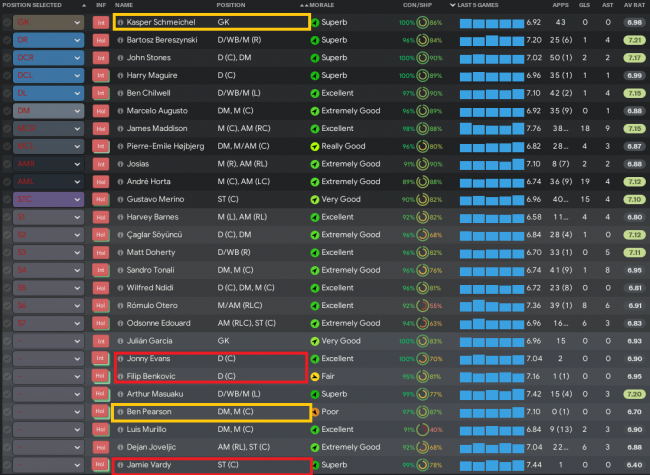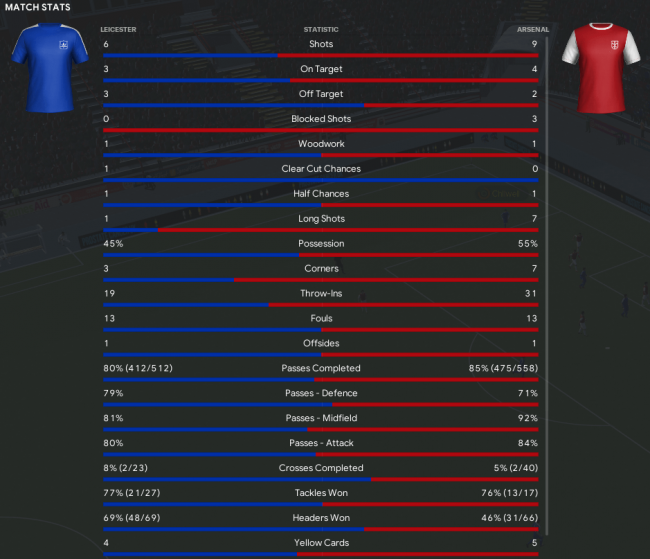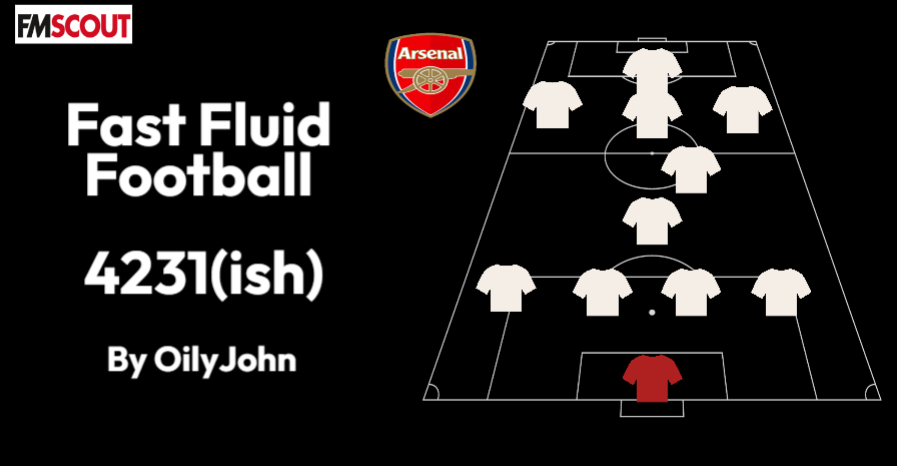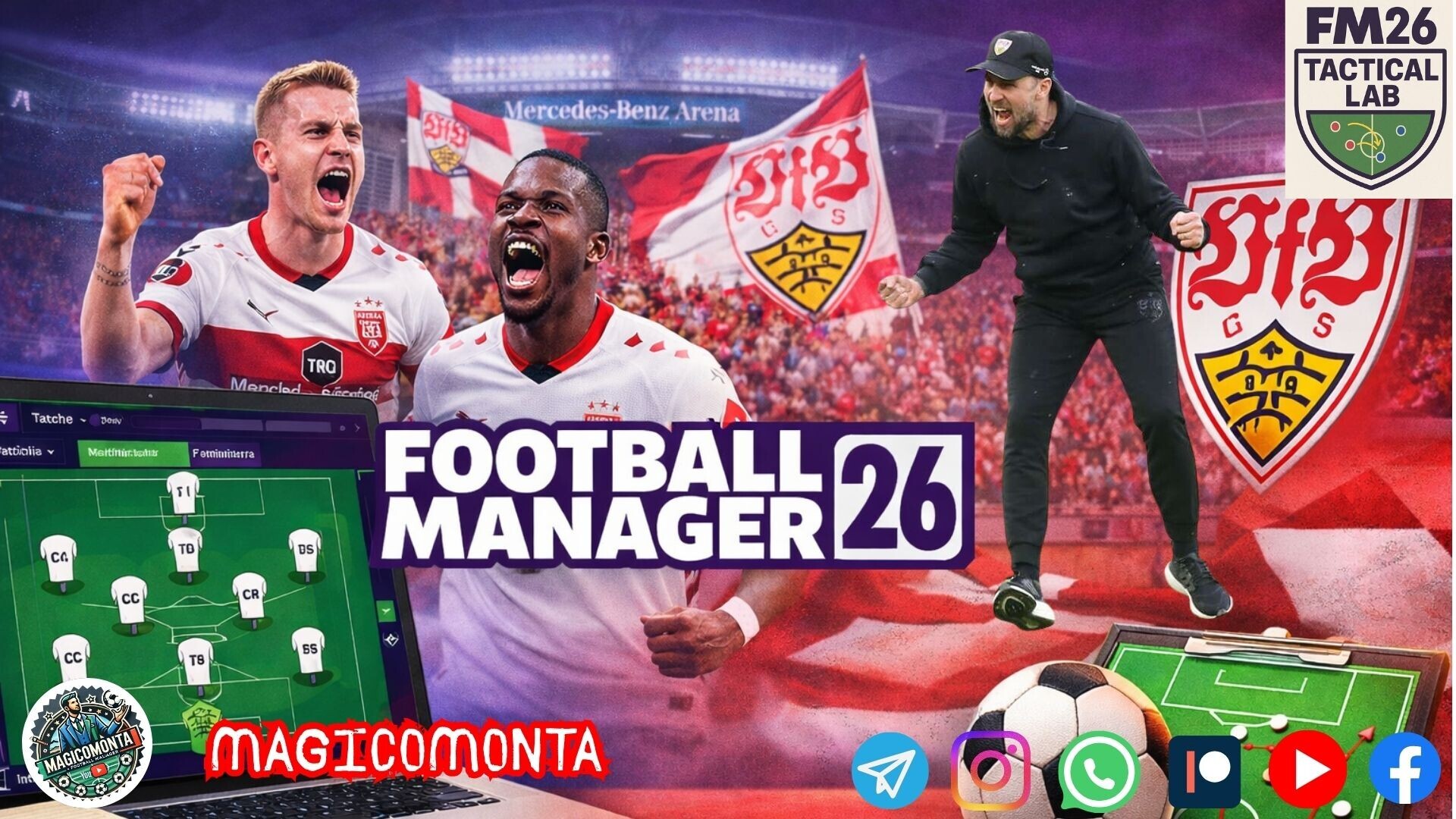
How I prepare for games against the AI.
I thought I would show you how it all this planning comes together to produce the results I want. I am currently managing Leicester, and the results I will show you are after 2.5 years in charge. I took over them midway through a season with them struggling bottom.I chose them over Newcastle, who were doing better in the league at the time, because I felt they had a much better balance to the squad to start. There was less work for me to do at the time. The players I had were also pretty well suited to what I wanted to do.
There were two good strikers in the squad. Four quality wing backs. Morrison and Tonali in midfield when I arrived were absolutely perfect for the central midfield duo. I knew I would be able to take this squad to better things with a few signings.
Just a few words on the signings I made. I do not have the screenshots to show you the evolution of the squad from when I took over to now. I never planned to write this at the time. So I will do it from memory.
In the first January I signed Hojbjerg to give me depth in midfield, and to provide me with the tools I needed there immediately to succeed. It was the weakest area by far. The first summer transfer window I sorted out the AMR and AML position.
Here I did not have a lot of money to spend. So I brought in two relatively cheap players. Andre Horta came from the USA to play AML, and has been excellent. Otero came in from Watford, who had just been relegated. He was initially a stop gap, but has played his way into my long term plans.
He has the habit of scoring absolute wonder goals in important matches when we really need something. That is absolutely invaluable. I also signed various young players my scouts had found to integrate into the team eventually.
The start of the third season, I signed Stones for 17.5 million, which is an absolute bargain. I did not need a CB at the time, but you do not turn down a chance like that. I had finished in the top four (never really challenged for the title seriously) so I could attract better players.
I also signed another DMC who is more creative to complete my midfield (a regen who my scouts rated very highly). Joveljic came in to complete the AMRL complement of my side. I also signed a young right winger to eventually replace Otero, and because again my scouts rated him highly and I agreed.
I already detailed my transfers for the third season above. At the same time, I sold players who I did not need or want.
The reason I talk about this is because it is just as important to the results I show you as is the tactical side. As I have said many times in this thread, tactics and squad building are linked. Inextricably. In each window I identified the area of my team I needed to improve, and did it.
Now I am at the point where I do not need to make many signings in a transfer window to evolve the team. I am happy.
Notice the stats for the team, which was also shown above (ignore the boxes now).

What do these tell us?
I had designed the tactic so that the left winger and the right CM would be in a position to score goals. That they are the top scorers over the season shows that this has worked. The striker has also contributed which is nice. Indeed, only one player in the first team rotation did not score a goal.
This, to me, suggests that we are creating a lot of varied chances and are not over reliant on any one thing.
Looking at assists, we will see that my DLP (Tonali) and the CM(A) (Morrison) have the most. Both full backs have also contributed a lot. As has the right wing position.
I was trying to put the CM(A) into a position where he could score and create. He has clearly done this. I will note that Morrison takes free kicks and penalties, which inflate these statistics a little bit.
Again note that assists come from all over the team. We are creating a lot of different types of chances.
So we can be pleased with what we are seeing. Am I actually seeing the type of goals I wanted and expected to see though? I actually watched back all the goals I scored this season and made a note of what caused them. I will not list all of them, just the most important.
The main type of goal we scored was on the counter. I counted 10 goals which were counter attacking. This is partly expected since I do have “counter” set in my tactic, and I have a bunch of good fast players.
18 goals resulted in crosses, either from L/RFB or from L/WR. This was something I expected and wanted to see from my tactic. We scored a bunch of goals from overloading one side of the pitch, leaving the over side with space, and finding the opposite winger or striker. I see what I wanted to see.
Most of the rest of the goals that did not come from dead ball situations were from the interactions between the DLP, CM(A) and DLF. This was the use of these players to create and exploit space.
I did not see many goals from overlapping of the CM with the DLF, but 6 goals came directly from the CM exploiting the space the DLF left (for the CM I should say). There were 10 goals where the interaction of the DLP and CM(A) create space for a through ball to someone else in the side. H
Note that this only takes into account the actual goals. Not the chances we create. I see similar trends when looking at chances. We average at least 10 shots per game, almost always good or decent quality. We could probably up the goals easily by having better players than I currently do.
In particular my striker and LW blew hot and cold during the season. More consistency would give more goals. So there is definitely room for improvement, but hopefully that comes with success.
To conclude, following my formula definitely works for me. I planned my tactic, and got the players who can implement it. This lead to the attractive football I wanted to see, and results that exceeded my pre season objectives.
How to read a game and make specific changes.
I will typically do this against teams that are better than me, because I can normally impose myself on teams who are worse. I use this example because it was a recent game, and things worked well.Note that sometimes you are just going to get outplayed and will lose even if you make the correct changes. It could be the difference between losing 3-0 and 1-0 only. I am not able to make changes to win all the time. I doubt anyone can. You should not expect to.
So use this as a way to see how I read the game.
So this is part 5 of an epic series of games I have played against Arsenal lately (part 6 is actually 2 games later). I think I played them perhaps 5 times in the last 10 games; once in the league, an FA cup semi final, the Champion’s League semi final, and the charity shield.
I’m sick to the back teeth of them actually. They knocked me out of both cup competitions. I did get the win in the league, but it was lucky. I struggle against this Arsenal side, they are a bogey team.
The advantage I have is that I have played them so much I know what they will do in advance, pretty much. I still will take things as they come.
So match day comes. I make two immediate changes to the way I play based on prior experience. One change is regarding the pressing. I drop the line of engagement to normal, and I stop counter pressing. Why? It is simple. Arsenal are good. Very good.
They can play around my counter press and have attackers that can hurt me. I still want to pressure them, but not as much. I want my players to form a more compact defence, and press less immediately after we lose the ball.
Dropping the line takes care of the former (my pressing line and defensive line are closer now, so we are more compact). No counter press takes care of the latter. I also put the right full back on defend. He has a CM(A) on his side, and I want to leave more defenders back to cover against the strong attack of Arsenal.
How does it play out? 6 minutes in and they played around my reduced press. That does not bother me though, because we already slowed them down enough to get players into position.
The problem is the striker. He gets the ball, performs a wonderful turn and skins both my defenders. This guy is quick. Very quick. Much quicker than my defenders (who are not slow, just slower). He is right in on goal, and probably should score.
If I see this after 6 minutes, I will probably see this again. I have spotted a problem and need to fix it. How?
My idea was to just drop my defensive line back too. I really do not mind a ball coming in to their striker in that position. He is isolated without much support. It was the pace that did the damage here.
So dropping my defence will mean they are in a much better position to deal with that next time. This is actually very effective, since I do not see anything like this happening again.
However, I did not think this through very well as it turns out. We are getting totally outplayed here. We actually did not have a shot in the first half (which is really a bad sign, but one I was used to against Arsenal). What was going on. I should have picked up on this a lot sooner, but I got a highlight eventually.
We are trying to play out of defence, and being pressed heavily. In itself this does not bother me. I have players who are calm on the ball. The problem is that we have dropped everyone too deep. We have no way out. The ball is endlessly recycled until we give it away.
If we keep playing like that we will eventually make a mistake and Arsenal will get a chance. This is why I am having no shots, but also why Arsenal are doing nothing much either.
How to fix this conundrum?
Again, it is simple, but I did a few things that you may not immediately think off. I need to stop this passing. The obvious way is to stop playing out of defence. Let’s remove that TI. However, that does not address how I am going to attack instead.
If I just remove it, I probably will just lose the ball faster. I also do not want to discourage the press, because you can get good chances from counters if you beat it (see the above post with the goal against Man Utd).
So my plan was this. I still let the keeper pass the ball to either CBs or FBs. This means we are in control of our restarts (and I lack a strong aerial threat to win long balls anyway). However, now without the need to play from defence, they are freer to pick whatever forward pass is best.
Then the more subtle change is to shift form a DLF(S) to DLF(A). The reasoning here is simple. On attack, the striker will in general be more advanced. He provides an outlet and will occupy the defence a bit more. This gives me an outlet that I can hopefully use to bring other players into play.
Does this all work? Actually, it all came together perfectly.
After zero shots in the first half (and a bit of a rollicking at half time), we have the better for the second half. 6 shots to 5. Arsenal never pose a goal threat again (they hit the post from a corner I think is all). They have 7 long shots out of 9 total shots.
That is my deeper defence with less pressing working. We have 6 shots, only one long. Which means we are creating better chances than they are.
The winning goal was a think of beauty, where these changes I made did have an effect.
First, we just have to acknowledge that Maddison makes a perfect interception. That is not really part of my tactic, just the player being excellent. My defence is extremely compact. We are not giving any free space in or around the box.
This is why Arsenal struggled to do anything meaningful with the ball. That was the plan I made with my defence.
After the interception, it proves that the striker as a DLF(A) was a good idea. He was already forward, and in position to get the ball from the onrushing Maddison. This is exactly the sort of attacking outlet I needed.
From there it is just another ascetically pleasing counter attacking goal (it reminds me of vintage Man Utd under Ferguson. We get a bit lucky with where the ball goes from the tackle, but you need luck sometimes.
The DMC (Marcelo) does exactly what he is designed to do; plays a simple pass to a player in a better position. The cross from the LB is perfect. The back post is unmarked, goal for the right winger. I love goals like this.
Here are the stats.

You can see we were pretty even overall, although the first half was Arsenal’s while the second belonged to me. We defended particularly well, and it was a very pleasing victory against a side I hate playing.
I will note, however, that this was not the best example of me being tactically clever. I waited way too long to notice my problems, and hence too long to fix them. We could have been out of the game by then. So these kinda things are hard to do.
I spotted the problems and made the correct changes, but I was still quite lucky here. So another message is do not take this post as me being some kind of tactical genius. That you should be able to do this every match. That I can do this every match (these 5 games with Arsenal are now played 5 won 2 lost 3, so I am clearly not doing that great all the time).
Just being able to notice things and make positive changes is a good thing. Sometimes you will get a pleasing victory. Sometimes you are too late. Sometimes the other team is just too good. You cannot win them all, do not expect to.
Are OIs really the only way to let your tactic work?
Almost certainly not. I do not think many people actually use OIs like this (or they do not post about it) and are able to achieve similar things. I use OIs because it seemed like the obvious way to create zones where we press and zones where we don't.I started to do this before the concept of line of engagement, so it was harder to define when and where to press. I think you could achieve very similar effects using player instructions for closing down. The way I have presented it, I actually look at a global picture for closing down.
I do not necessarily tell certain players to close down, but trust that they will not do anything too stupid from my instructions. You can approach it from the polar opposite, and focus on exactly how you want specific players to press.
Players are still more likely to close down the players around them; my striker will rarely find himself in the position to close down a left winger for example. So individual instructions will be able to replicate this. I just find them a little bit too unspecific, but that is personal.
The most important thing is to have an idea of what you want the players to do when they press (this is pretty much true always, know what players should do and it is so much easier to set them up).
If you look at my OIs, you can see that I want my front three to be closing down like demons (everyone in their area is closed down more in the OIs). They harry the defense to force mistakes/aimless clearances.
I want this because I like how Klopp's teams look when they do this. I want my midfield to close down less, but I do want them to try to stop the other team having too much time on the ball. They have to balance closing down and holding shape.
I'd actually have the CM(A) closing down more than the DLP(S) actually, since he should be further forward when we lose the ball typically. So very high pressing for forwards, high pressing for the CM(A) would be where I would start.
You can adapt this for any tactic really, just think what each player should be doing and add the corresponding instruction. And do not forget to check they are doing what you want!
How to grow youth and transfer/loan policy in relation to it?
I do not really do anything special with kids. I have not really tackled the new training module yet. It looks complicated and I need to try to understand it better at some point.Right now I leave it to my assistant and he does a great job. I make sure he is a similar coach to how I would be, and let him have free reign. I do set all individual training myself though.
With young players, the things I proactively do is to give them as much game time as possible. Depends on the player how much. I usually have factored in young players to my long term plans, so their involvement is ramped up over time.
Meaningless games are good for this. The league cup (or foreign equivalent). Games in the UCL if you make it out of the group early. Games at the end of the season if you have nothing left to play for. Also give them substitute appearances. Exposure to the first team has a strong positive influence on a player.
In terms of loans, there are only a few times when I use them. My young players who are probably never going to make the first team can be loaned at will. Typically from age 17-20 is when they will be loaned (once they are out of the U18 side.
I will not loan out every player. Only if I think there is a reason. Either the player will never make it at my club and may as well go play somewhere else, or will benefit from the loan in terms of progression.
As soon as a player is good enough to be involved in my first team, I do not send him on loan. I'd rather he played less games for me than a full season on loan. The exception being when there is no space for a player to rotate in and out of the squad.
Goalkeeper, for instance, is not an easy place to rotate. Central midfield is currently another one for me at the moment.
In terms of transfers. If I can rely on my own youth system I will. I actually keep everyone around for as long as possible. Anyone who has a chance to be a decent backup is worth keeping as they are home grown.
In terms of scouting players, I just let my scouts get on with it. I will give them assignments to look for youth in areas of the world where good youth tends to be found. This is why I have a bunch of south american kids in my current squad.
Talented players from small teams should be signed always, if you can afford it and they get a work permit. They are almost always at a good price. From bigger clubs, it depends on the price.
How do you handle pep talks in different situations, including pre-match, half-time and post-match?
Team talks and press conferences go together for me. They are both there to motivate players, to take off pressure (or add it), and to elicit the correct response from players. As such, it is entirely situational, and it quite difficult to assess every single scenario that may occur.I will try to give an idea of some of the things I do.
Firstly, I always do my own press conferences. I am not sure exactly how much they affect matches, but there is something to it. As I noted, press conferences are about motivation and taking away pressure.
It can also be about taking criticism for the team, and giving out praise when it is due. Some questions I almost always do not answer because I do not know what to say. Usually I ignore direct questions about opposition players, why bother motivating them.
I am usually neutral about other managers too. Either take the middle ground or say nothing. Do not give free motivation. Same for the "who will win the league". Unless it is me, and I want to give the players a kick in the arse, I will ignore this question.
Let's take a couple of examples in full. Firstly, imagine we are playing against a team we should easily beat. It is quite early in the season (i.e. there is no particular pressure on this match). The team has been performing well. How do I handle press conferences and team talks?
Well, in pre match press conferences I will try to praise the team to make them happy that they are playing well. I will keep my eye on their recent performances and body language.
If there is no real sign of complacency I will make sure questions such as "any worry about complaceny" are dealt with by saying "no". Mostly because I do not. This is because I do not need to make them worry.
If they are playing well, just let them get on with it. No need to make them get nervous about a game when they were not before. There is rarely need to add pressure to a game.
On the flip side, if I have noticed some complacency in the side (either from performances - goals from players switching off - or from body language) I will be a bit more harsh. Tell the press I am concerned about complacency and the players need to be too.
When we get to the pre match team talk, there are two options. If the team are playing well and won well last time, I use "go out and play like last time" or whatever the option is. Couple it to a "have faith" individual talks because it seems to make players happy if they respect you.
If I want to guard against complacency, I will tell them I expect a win. This adds pressure, but I want that to fight complacency. I also often couple this to "have faith" (which is basically saying I expect you to win, but I have faith that you can).
I use "expect a performance" for players who are particularly difficult to motivate (although I do not have many players like that now, because of how I built my side). I will deal with half time and full time team talks separately.
For a post match press conference, same rules as the pre match. Praise players as appropriate. If I struggled to win a game we should have won, I will often criticise the team. Give them a bit of motivation going forward.
Now the opposite extreme. Let's take another game we expect to win, but this time at the end of the season. When we are fighting for a title. We need to win it. This is a very high pressure match. Pressure can be a good thing.
Players who have the attribute to handle pressure will often step up for these matches (James Maddison was the player who did that for me at the end of my last season, he was immense). However most players will tend to be negatively affected by pressure.
For big games (and the end of the season when fighting for something) press conferences and team talks are all about removing as much pressure as I can.
In press conferences, this means avoiding predicting we will win, or that we are favourites. This is okay if you actually are, but if you are not you add a bucket load of pressure onto the players. I struggle for exact example right now, because I would to be in this kind of press conference.
You get the idea though. Take the pressure off the team by deflecting questions as much as possible. For team talks, I do much the same. I am a lot less demanding of players in team talks.
I avoid things like "do it for the fans" because that is adding pressure. I also avoid "no pressure" because that is clearly a lie. Say whatever you have found will motivate them. I typically will tell play their natural game. Or I have faith. I will almost always use "have faith" individual team talks.
This kinda thing is more tricky, it took me a long time to work out how to do it, and it is dependent on the players you have. You have to learn how they will react to know what to say. I do not think there is a correct way that works always.
I mean, if I had a team of players who enjoy big matches I might try to ratchet the pressure up, maybe it would work, I never tried but who knows.
There are a bunch of things in between. I cannot cover everything. The main idea is to use common sense, and think of the situation. Oh, and I love the "get revenge" thing, always seems to motivate players. I'm not sure the extent team talks affect matches anyway.
Regarding half time team talks. These are of course situational. I am much harsher on my team winning only 1-0 at home to Nohope FC (aka Huddersfield, signed a sad Terrier) and playing poorly, than I am when losing 1-0 to RichAsFluff Rovers (aka all my rivals) away.
The aim here is to motivate your players to do as best as possible in the second half. Only yell if they really, really deserved it. Like losing to Nohope FC! You can yell at the end, at half time you are motivating your players.
A lot of the time if we are comfortable at half time I do not say a thing. If there is nothing to say, say nothing. I will only praise if we have just absolutely flattened a team and played beautifully.
I think the last time I did that was when we came from 0-1 down away to Benfica to lead 3-1 at half time after some sensational play.
Full time team talks are also situational, and you should take some care what you say. If your team has been on a poor run, and you finally scrape a win, be nice. Even if they were actually below what you expect, be nice. Moral and motivation will be gained.
Conversely, a team who are in good form but scrape a win can be told they were crap if they were. Otherwise it is again common sense that follows from the situation of the match. I will give overall team talks based around the situation, and individual team talks to address player performances.
If a player has done well, do not be afraid to give him a lot of praise. This can be very beneficial sometimes. Equally, do not be afraid to lay into a player who played badly.
I should also note I will use warnings if a player has had a particularly poor match (less than 6.3). I am extremely harsh on players who get sent off too, I feel there is never an excuse for a straight red.
Also do not criticize too many players if you say "well done" or vice versa. This makes no sense, and upsets the players (which does make sense, "you were good guys, except you 7, you sucked" is not consistent).
As with everything else I have said, know your players and how they react, and know the situation you are in. From there, common sense pretty much guides your hand fairly well.
How do you prepare for opposition?
I tend to try to understand teams from past experience, and from what I see in a match more than anything. There are many levels to how you can prepare for playing any given team.The most basic is just to know what to expect based on your relative standings. So if I play away to Manchester United, I know I am going to be attacked and face an aggressive side. If I play a third division side in the cup, I can expect to face a parked bus or at the best a defensive side.
This is the simple, easy way to know what to expect. It will inform of what your strategy should be. I will play a more defensive direct counter attacking style against big teams. Abandon the counter press, sit deeper. I will try to work the ball more, be more attacking, get more players running and moving against a defensive side.
You can easily get one level deeper than this just using your own experience of playing the game. There are teams you know will park the bus. Teams you know like to build from the back. Teams you know are based around counter attacks. Or teams you know play with formations you have struggled against (I hate the 3412 formations you see in Italy, for example, it is so hard to make space for attackers).
There is no real advice I can give here. Either you know what a team will do or you do not. If it helps, you can keep notes of how a side plays. Including what sort of passing they use, how the keep the ball, and what their favoured type of attack is.
I do not keep notes, because I can remember pretty well what teams have done against me before. A good memory is a gift that never stops giving.
The next step is to pay attention to the scout reports you get prematch. This will give you an idea of their formation, their mentality, their style. It will tell you what they do well and where there assists come from.
Who is scoring their goals. How hard is it to score against them? Where can I create chances? Where are they strongest in defence? Really this is almost all you need. They are weak to crosses from the left? Well, lets try to exploit that. They score through overloads on the right? Better make sure my left back has correct support.
Further than this, you can look at who their key players are. Either through experience of playing them, or just seeing who is playing the best. Who is creating? Who is scoring? If a team as a single creator, can you shut him down? If they get all their goals from a single player, can you stop him from getting chances? Are their defenders slow? Bad in the air? Do they have a player with low bravery? All of these are things you can think about exploiting.
As a concrete example, imagine you play a team with a monster striker who scores with his head because he has excellent jumping reach, headers, and height. I may think about putting my best heading defenders on the pitch, even if they are not my strongest. At least make it challenging for him by contesting the air. If their striker is super fast and with good off the ball, I want a defender on him who is also fast and has good anticipation/positioning.
There is also something else at play here. How much do you want to change in order to match up to a team? For myself, I would rather impose myself on that team and make them adapt to me. That may mean changes to exploit a weakness. Or changes because a typical style for my teams will not work.
For example I know if I play a team with two DMCs that the DLF/CM axis is not going to be super efficient because that area is covered. So I change it. For example use a MEZ(A) and overload a flank. Or withdraw the midfield to force the DMCs to come out and leave space.
This is a proactive change, for me. I am changing things based on common sense to hurt the opposition.
When it comes to making changes specifically to nullify the opposition, I usually see this as something I will do only if I have to. If I know I cannot let their creative DLP sit and dictate play from the DM slot under little pressure. Or I know their striker will force me to really drop the DL. I do not make changes for the sake of it.
At the end of the day, I want to get my team playing my football. I do not want to make so many changes every game that I am lacking my own tactical identity. Think of it like chess. Sometimes you have to sacrifice a piece to gain some activity elsewhere on the board, and to gain a decisive advantage.
The final thing which everyone should always do is adapt to what you see on the pitch. The is by far the most important thing. You can know all about the opposition beforehand. But to quote Helmuth von Moltke the Elder; "No battle plan survives contact with the enemy".
You could have had a great plan, only to realise the opposition has set up different to how you expect. Or score an early goal. Or you score an early goal. Adapting on the pitch is an absolute must.




![FM26 Data Tweaks [v1.7 | v3.0]](https://i.postimg.cc/t4fKVrB7/wonderkid.png)






Discussion: How I Approach FM: Tactical Frameworks & Squad Building
3 comments have been posted so far.